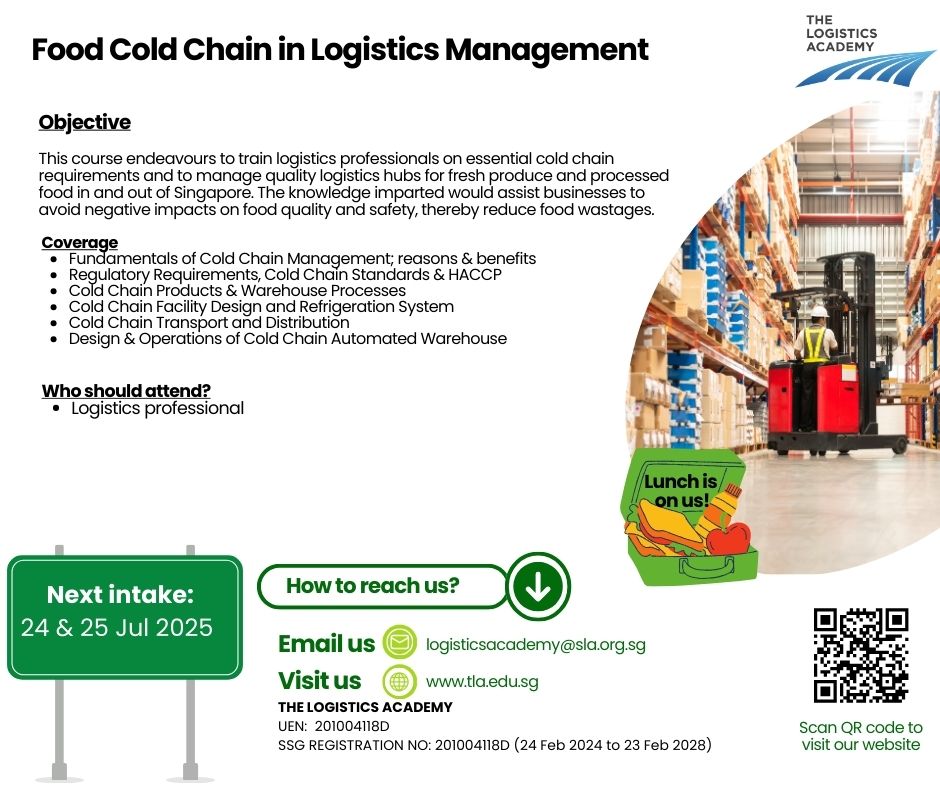Food Cold Chain Logistics Management

- 21 – 22 Jul 2025, Intake 06
- Next year’s Training Schedule — click here for dates (available end Dec or next Jan)
Objectives
Singapore imports over 90% of its food supply and these includes highly perishables food such as meat, fish, fruits and vegetable products. Singapore economy is driven by imports and exports, thereby warrants the importance of forming a sustainable and resilient supply chain of fresh produce and processed food
To ensure that these food products are safe at the point of consumption, it is paramount for businesses to have an effective cold chain management system. From transportation during import, to processors, distribution centres, retail and consumers, temperature sensitive products have to be kept within a specific temperature range to ensure food products are safe and of good quality.
This course endeavours to train logistics professionals on essential cold chain requirements and to manage quality logistics hubs for fresh produce and processed food in and out of Singapore. The knowledge imparted would assist businesses to avoid negative impacts on food quality and safety, thereby reduce food wastages.
Designed For
Logistics professional who wish to have deeper understanding of the Cold Chain Management, Cold Chain Standards, cold chain products, cold chain processes, design of cold chain facility and various warehouse automation systems for cold chain handling, and evaluate their usefulness & effectiveness for their logistics operations.
What you will learn
At the end of the programme, participants would :
- Understand what is Food Cold Chain Management and the benefits of cold chain.
- Understand the regulatory requirements, Cold Chain Standards, HACCP & benefits.
- Understand the cold chain products and processes to keep the required temperatures
- Understand a good design of cold chain distribution centre, and the refrigeration system for cooling temperatures.
- Understand the importance of and how to, maintain food cold chain requirements during distribution and transport.
- Understand the warehouse automations used in cold chain operations processes & the benefits.
Coverage
- Fundamentals of Cold Chain Management; reasons & benefits
- Regulatory Requirements, Cold Chain Standards & HACCP
- Cold Chain Products & Warehouse Processes
- Cold Chain Facility Design and Refrigeration System
- Cold Chain Transport and Distribution
- Design & Operations of Cold Chain Automated Warehouse
Fees
| SLA Member | Non-Member | Self-Sponsored | |
|---|---|---|---|
| Course Fee | $598 | $748 | $748 |
| GST | $53.82 | $67.32 | $67.32 |
| Application Fee (incl. GST) |
$32.70 | $32.70 | $32.70 |
| Total Fee (payable to TLA) |
$684.52 | $848.02 | $848.02 |
Payment
Payment will only be required after the course is confirmed.
(The status of the course would usually be advised one (1) month before the course start date.)
Payment mode (retail payments facilities are not available) :
Overseas – Telegraphic transfer
Local – Bank transfer or Corporate PayNow
Duration
2 days : 9 am to 5 pm (14 training hours)
Lecturer

Dickson Yeo is the Senior Logistic Consultant of Swisslog SEA since November 2016. He provides specialist support in logistics operations, translating client’s requirement and processes into the warehouse automation designs and automation project realisations in South East Asia region. Dickson also supported the implementation of 2 cold chain automated warehouses in SEA.
As a Director (Supply Chain) NTUC Fairprice for 12 years since 2003, he had managed the cold chain food logistics of a 180,000 sq. ft Fresh Food DC and the grocery distribution of 2 automated Distribution Centre. The Fresh Food DC has Frozen products, Dairy, Confectionary, Fruits and Vegetable coldroom operations and cold chain distribution to the local supermarkets. Dickson also contributed to the Cold Chain Standards SS668 development, as a member of Cold Chain Standards Working Group. The automation project implemented in 2014, was the Automated Storage & Caddy Pick Distribution Centre; with 52,000 pallets ASRS storage capacity and picking throughput of 120,000 cartons per day.
Certification
A Certificate of Attendance will be awarded upon successful completion with 75% attendance.